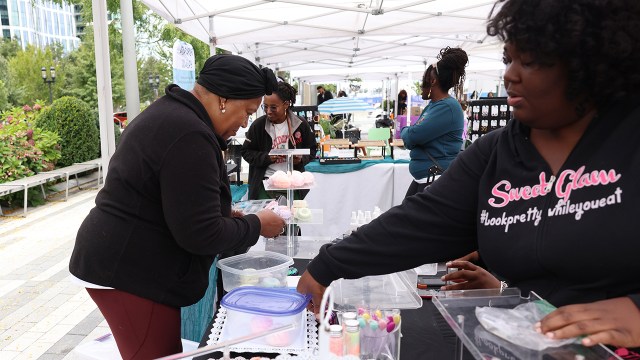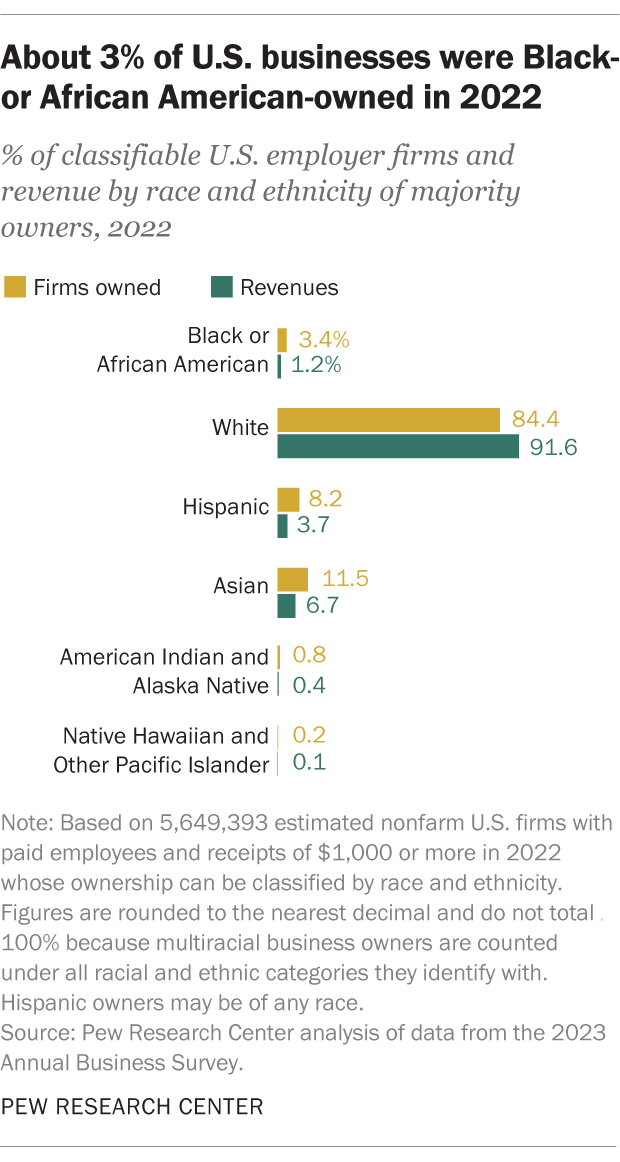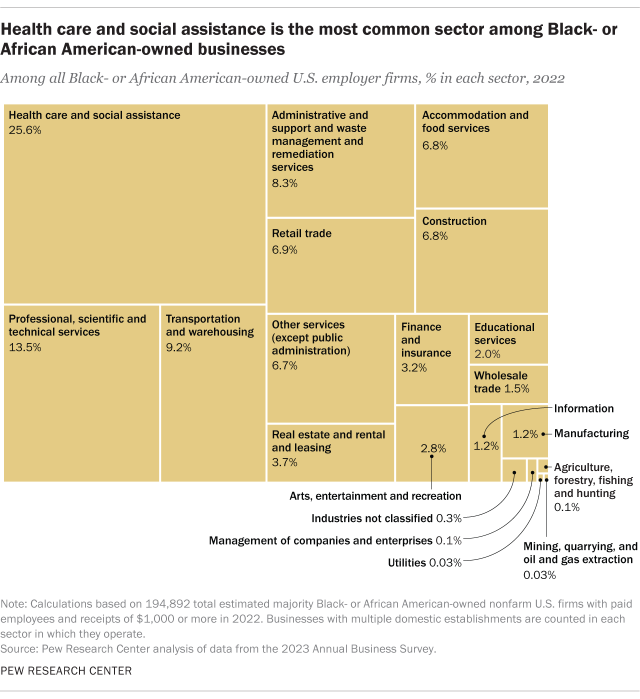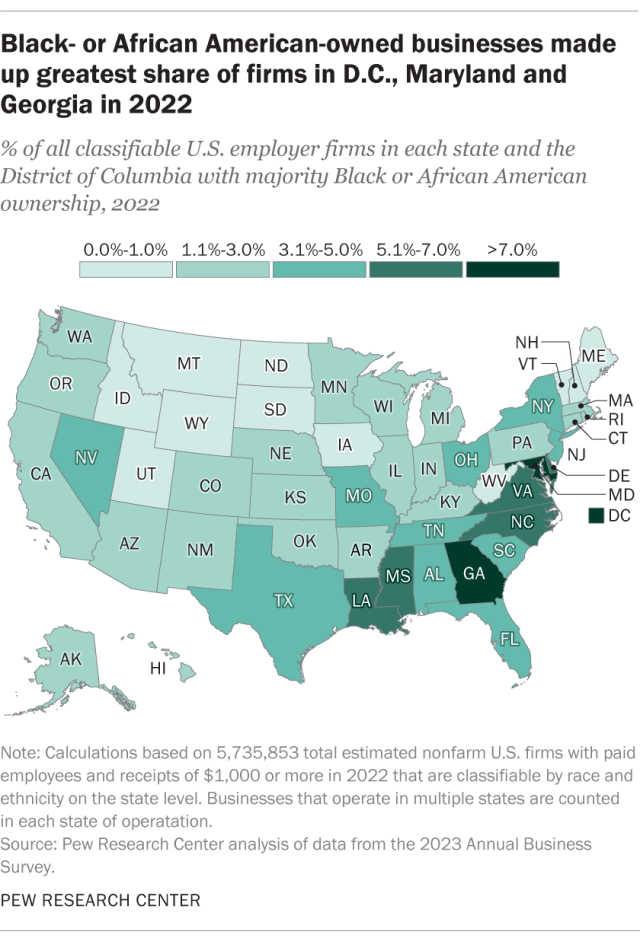
More than one-in-five Black adults in the United States say owning a business is essential to their personal definition of financial success, according to a 2023 Pew Research Center survey. While Black-owned businesses have grown significantly in the U.S. in recent years, they still make up a small share of overall firms and revenue, according to our analysis of federal data.

In 2022, there were 194,585 U.S. firms with majority Black or African American ownership. That’s up from 124,004 in 2017, according to the latest estimates from the Annual Business Survey (ABS), conducted by the U.S. Census Bureau and the National Science Foundation. Black-owned firms’ gross revenue soared by 66% during this time span, from an estimated $127.9 billion in 2017 to $211.8 billion in 2022.
Despite this growth, majority Black-owned businesses made up only about 3% of all U.S. firms in 2022 that were classifiable by the race and ethnicity of their owners. And they accounted for just 1% of gross revenue from all classifiable companies that year. By comparison, in 2022, roughly 14% of all Americans were Black.
As has long been the case, White majority-owned businesses made up the greatest share of classifiable firms (84%) and their revenue (92%) in 2022. About one-in-ten classifiable firms (12%) had Asian American majority owners, and no more than 8% had majority owners from another racial or ethnic group.
How many workers do Black-owned businesses employ?
Black or African American majority-owned firms employed roughly 1.6 million workers in 2022. The firms’ annual payrolls were estimated at $61.2 billion.
About seven-in-ten Black-owned firms (71%) had between one and nine employees in 2022. Much smaller shares had 10 to 49 (13%) or 50 or more (3%) workers that year. Another 13% had paid employees at some time during the year but reported having none at the time the survey was conducted. (The ABS determines employment size by the number of paid workers during the March 12 pay period.)
What’s the most common sector for Black-owned businesses?
By far, health care and social assistance. Nearly 50,000 of the roughly 195,000 U.S. companies with majority Black or African American ownership, or 26% of the total, were part of this sector in 2022.
Looked at a different way, 8% of all classifiable U.S. businesses in the health care and social assistance sector were majority Black-owned that year.
Other common sectors included:
- Professional, scientific and technical services (comprising about 14% of all Black-owned businesses)
- Transportation and warehousing (9%)
- Administrative, support, and waste management and remediation services (8%)
- Retail trade (7%)
- Accommodation and food services (7%)

Where are Black-owned businesses located?

Most Black or African American majority-owned businesses (90%) are located in urban areas. Just 5% are in rural areas – that is, places with fewer than 5,000 inhabitants, under the Census Bureau’s definition. The remaining 5% could not be classified by community type.
Some of the most populous states also have the greatest number of Black majority-owned businesses. Florida had 21,064 such businesses in 2022, Georgia had 16,973, Texas had 16,849 and California had 16,826.
Black majority-owned businesses made up the greatest share of all classifiable firms in the District of Columbia (16%), Maryland (10%) and Georgia (10%).
Who are Black business owners?
- They’re more likely to be men than women. Some 54% of Black-owned firms in 2022 had men as their majority owners, while 39% had women as their majority owners. Another 7% had equal male-female ownership.
- They tend to be middle-aged. Half of Black or African American business owners who reported their age group were ages 35 t0 54 in 2022. Another 26% were 55 to 64, 16% were 65 and older, and just 7% were younger than 35.
- A majority have a four-year college degree. Among owners who reported their highest level of education completed, 27% had a bachelor’s degree and 34% had a graduate or professional degree beyond a bachelor’s in 2022.
What motivates Black entrepreneurs?
The ABS also asked Black or African American majority owners about nearly a dozen potential reasons why they own a business.
About nine-in-ten of those who responded said a very or somewhat important reason was the opportunity for greater income; a desire to be their own boss; or wanting to balance work and family life. Seeing business ownership as the best avenue for their ideas, goods and services (88%) and having flexible hours (87%) were also commonly cited reasons.
For most Black or African American majority owners, their business is their primary source of income. Of those who reported primary income information in 2022, 71% said this was the case.
Note: This is an update of a post originally published on Feb. 21, 2023.
